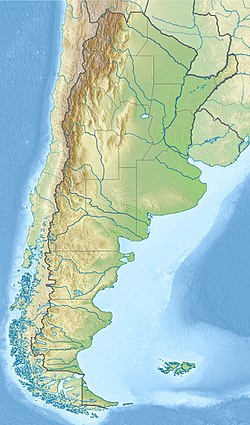The Huitrera Formation is a geological formation in the Neuquén Basin in northern Patagonian Argentina whose strata date back to the Early Eocene of the Paleogene, or Casamayoran in the South American land mammal age classification.
| Huitrera Formation | |
|---|---|
| Stratigraphic range: Early Eocene (Casamayoran) | |
 | |
| Type | Geological formation |
| Underlies | Collón Curá Formation |
| Overlies | Angostura Colorada Formation |
| Thickness | Up to 1,300 m (4,300 ft) |
| Lithology | |
| Primary | Mudstone, sandstone |
| Other | Andesites, dacitic & rhyolitic ignimbrites, volcanic breccias, tuffs & trachybasalts |
| Location | |
| Coordinates | 41°00′S 71°12′W / 41.0°S 71.2°W |
| Approximate paleocoordinates | 43°30′S 61°12′W / 43.5°S 61.2°W |
| Region | Neuquén & Río Negro Provinces |
| Country | Argentina |
| Extent | Neuquén Basin |
| Type section | |
| Named for | Cerro Huitrera |
| Named by | Ravazzoli & Sesana |
| Year defined | 1977 |
The formation is together with the Reyhuau basalts part of the Pilcaniyeu Belt, a volcanic belt active in Paleocene to middle Eocene times.[1]
Description
editThe Huitrera Formation was first defined by Ravazzoli and Sesana in 1977. The name has been used to identify various volcaniclastic sequences, among others in the Ñirihuau fold-and-thrust belt.[2] The up to 1,300 metres (4,300 ft) thick formation comprises mudstones and sandstones deposited in a crater lake environment. Part of the formation comprises andesites, dacitic and rhyolitic ignimbrites, volcanic breccias, tuffs and trachybasalts.[3]
The formation was initially described as Late Eocene to Early Oligocene, but was later dated to 54.24 ± 0.45 Ma, meaning the Huitrera Formation is Ypresian, or in the SALMA classification, Casamayoran in age.
Fossil content
editThe following macrofossils were reported from the formation:[4]
The formation has also provided many pollen, analyzed in 2003 by Melendi et al.[12]
See also
edit- South American land mammal ages
- Laguna del Hunco Formation, contemporaneous fossiliferous formation of the Cañadón Asfalto Basin
- Itaboraí Formation, fossiliferous formation of the Itaboraí Basin of Brazil
- Bogotá Formation, contemporaneous fossil flora-bearing formation of central Colombia
- Green River Formation, contemporaneous fossiliferous formation of the central-western United States
- Klondike Mountain Formation, contemporaneous fossil flora-bearing formation of Washington State
- Messel pit, Eocene crater lake Lagerstätte of Germany
References
edit- ^ Fernández Paz et al., 2020
- ^ Escosteguy & Franchi, 2010, p.420
- ^ Prez & Massafero, 2013, p.228
- ^ Huitrera Formation at Fossilworks.org
- ^ Degrange, F. J.; Pol, D.; Puerta, P.; Wilf, P. (2021). "Unexpected larger distribution of Paleogene stem-rollers (Aves, Coracii): new evidence from the Eocene of Patagonia, Argentina". Scientific Reports. 11 (1): Article number 1363. Bibcode:2021NatSR..11.1363D. doi:10.1038/s41598-020-80479-8. PMC 7809110. PMID 33446824.
- ^ Báez & Pugener, 2003
- ^ Aranciaga et al., 2019
- ^ Jin et al., 2020
- ^ Ramírez et al., 2016
- ^ Jud et al., 2018
- ^ Barrera et al., 2012
- ^ Melendi et al., 2003
Bibliography
edit- Fernández Paz, Lucía; Iannelli, Sofía B.; Echaurren, Andrés; Ramos, Miguel; Bechis, Florencia; Litvak, Vanesa D.; Encinas, Alfonso; Kasemann, Simone; Lucassen, Friedrich; Folguera, Andrés (2020). "The late Eocene–early Miocene El Maitén Belt evolution: Magmatic response to the changing subduction zone geodynamics" (PDF). Journal of South American Earth Sciences. 103. Bibcode:2020JSAES.10302713F. doi:10.1016/j.jsames.2020.102713.
- Jin, Mengjie; Zwick, Andreas; Ślipiński, Adam; Marris, John W. M.; Thomas, Michael C.; Pang, Hong (2020), "A comprehensive phylogeny of flat bark beetles (Coleoptera: Cucujidae) with a revised classification and a new South American genus", Systematic Entomology, 45 (2): 248–268, Bibcode:2020SysEn..45..248J, doi:10.1111/syen.12392
- Aranciaga Rolando, Alexis M.; Agnolin, Federico L.; Corsolini, Julián (2019), "A new pipoid frog (Anura, Pipimorpha) from the Paleogene of Patagonia. Paleobiogeographical implications", Comptes Rendus Palevol, 18 (7): 725–734, Bibcode:2019CRPal..18..725R, doi:10.1016/j.crpv.2019.04.003
- Jud, Nathan A.; Iglesias, Ari; Wilf, Peter; Gandolfo, Maria A. (2018), "Fossil moonseeds from the Paleogene of West Gondwana (Patagonia, Argentina)", American Journal of Botany, 105 (5): 927–942, doi:10.1002/ajb2.1092, hdl:11336/183708, PMID 29882954
- Ramírez, Leonardo C.; Corsolini, Juan; Di Iorio, Osvaldo (2016), "First fossil record of parasitic flat-bark beetle (Coleoptera: Passandridae) from the Eocene of Patagonia, Argentina", Ameghiniana, 53 (2): 160–169, doi:10.5710/AMGH.29.11.2015.2920, hdl:11336/13059
- Prez, Horacio; Massaferro, Gabriela (2013), "Geología y geomorfología del tramo superior del Arroyo Comallo, Río Negro" (PDF), Contribuciones Científicas GÆA, 26: 221–234, retrieved 2020-06-13
- Barreda, V.D.; Palazzesi, L.; Katinas, L.; Criscri, J.V.; Telleria, M.C.; Bremer, K.; Passala, M.G.; Bechis, F.; Corsolini, R. (2012), "An extinct Eocene taxon of the daisy family (Asteraceae): evolutionary, ecological and biogeographical implications", Annals of Botany, 109 (1): 127–134, doi:10.1093/aob/mcr240, PMC 3241571, PMID 22179952
- Escosteguy, Leonardo; Franchi, Mario (2010), "Estratigrafía de la región de Chapelco, Provincia del Neuquén" (PDF), Revista de la Asociación Geológica Argentina, 66: 418–429, retrieved 2020-06-13
- Báez, Ana M.; Pugener, L. Analia (2003), "Ontogeny of a new Palaeogene pipid frog from southern South America and xenopodinomorph evolution", Zoological Journal of the Linnean Society, 139 (3): 439–476, doi:10.1046/j.1096-3642.2003.00085.x
- Melendi, D.L.; Scafati, L.H.; Volkheimer, W. (2003), "Palynostratigraphy of the Paleogene Huitrera Formation in N-W Patagonia, Argentina", Neues Jahrbuch für Geologie und Paläontologie, Abhandlungen, 228 (2): 205–273, doi:10.1127/njgpa/228/2003/205
